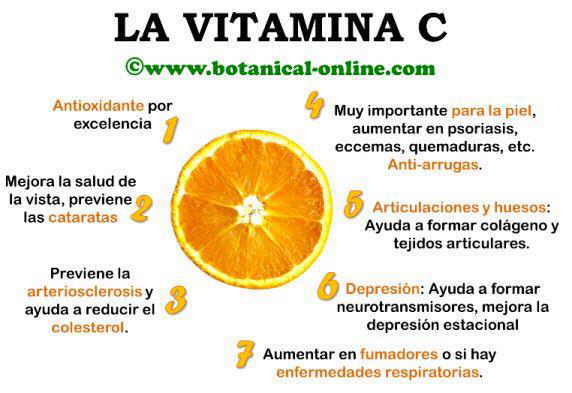
Summary on Vitamin C
La Vitamin C o L-ascorbic acid takes its name from the ability to cure scurvy, a disease that in the past affected sailors who were unable to take fresh vegetables for a long time.
It is necessary to take vitamin C with food because our body is unable to synthesize it. In our body, there is only a small reserve of it within the adrenal glands.
The positive functions of this vitamin are manifold:
- facilitates the absorption of iron (adjuvant in the incorporation of iron into ferritin)
- stimulates the immune system
- reduces the damage caused by the consumption of products containing food preservatives such as nitrates and nitrites
- it intervenes in the production of collagen, an intracellular substance that constitutes the structure of muscles, bones, cartilages and tissues.
- it intervenes in the synthesis of some important hormones and neurotransmitters
- it has a powerful antioxidant effect and counteracts the effects of toxic substances such as smoke and pollution
- protects the skin from ultraviolet rays
Main sources in nature:
Citrus Fruits, Kiwi, Black Currant, Strawberries, Sweet Peppers, Chilli, Parsley, Cauliflower, Sweet Potatoes, Broccoli, Brussels Sprouts, Strawberries, Tomatoes.
DOSAGE: between 45 and 60 milligrams (more or less the dose contained in a medium-sized Kiwi). However, to appreciate its antioxidant effects, a daily intake of at least 200 milligrams / day is required.
Food |
Vitamina C (mg/100g) |
| Brussels sprouts | 81 |
| Strawberries / Clementines | 54 |
| Lettuce | 59 |
| Lemons / Oranges | 50 |
| Tangerines | 42 |
| Kiwi | 85 |
| Hot peppers | 229 |
| Red and yellow chillies | 166 |
| Raw peppers | 151 |
| Green peppers | 127 |
| Ripe tomatoes | 25 |
| San Marzano tomatoes | 24 |
| Grapefruit | 40 |
| Salad tomatoes | 21 |
| Orange juice | 44 |
| arugula (rocket salad) | 110 |


























